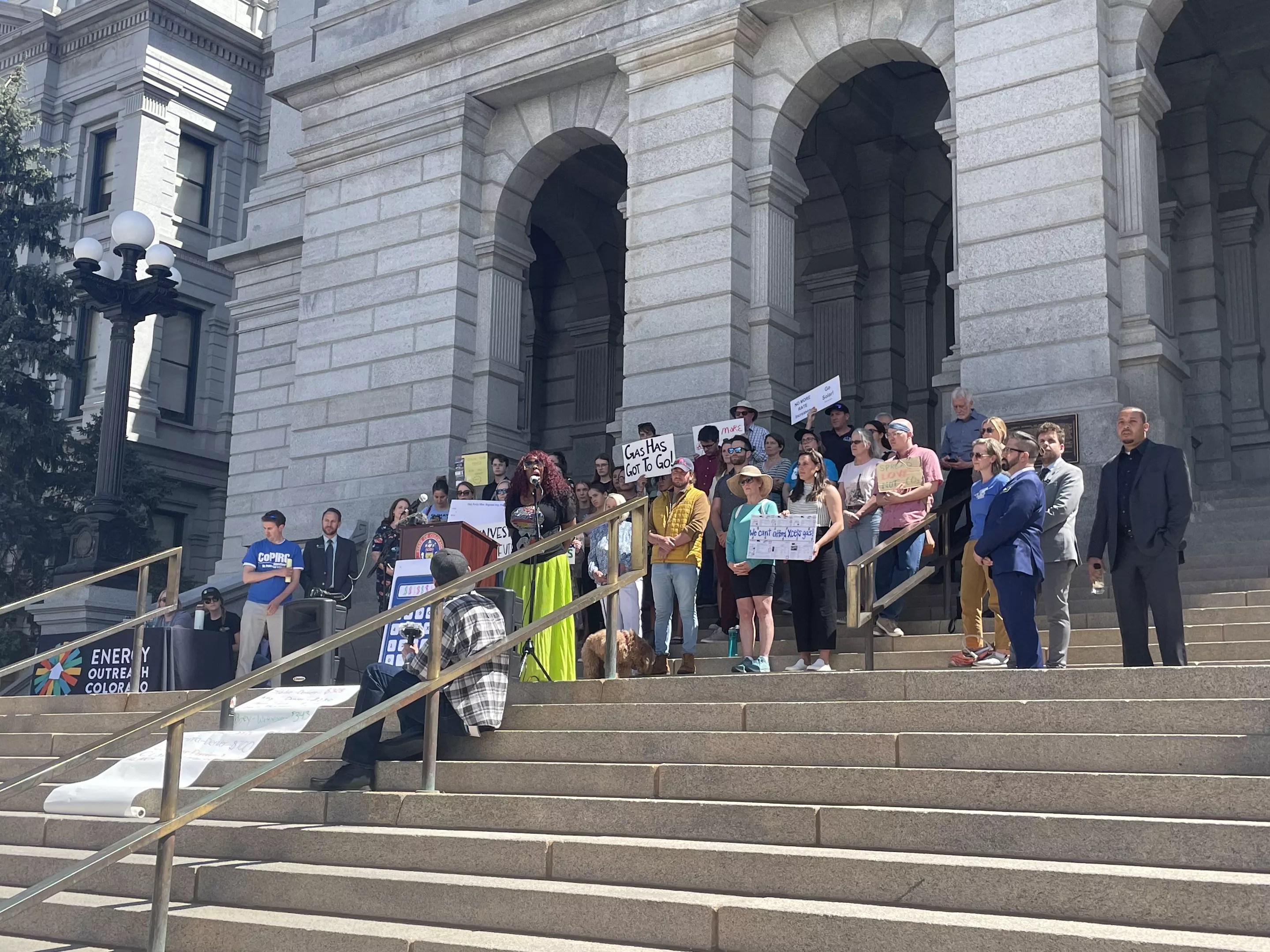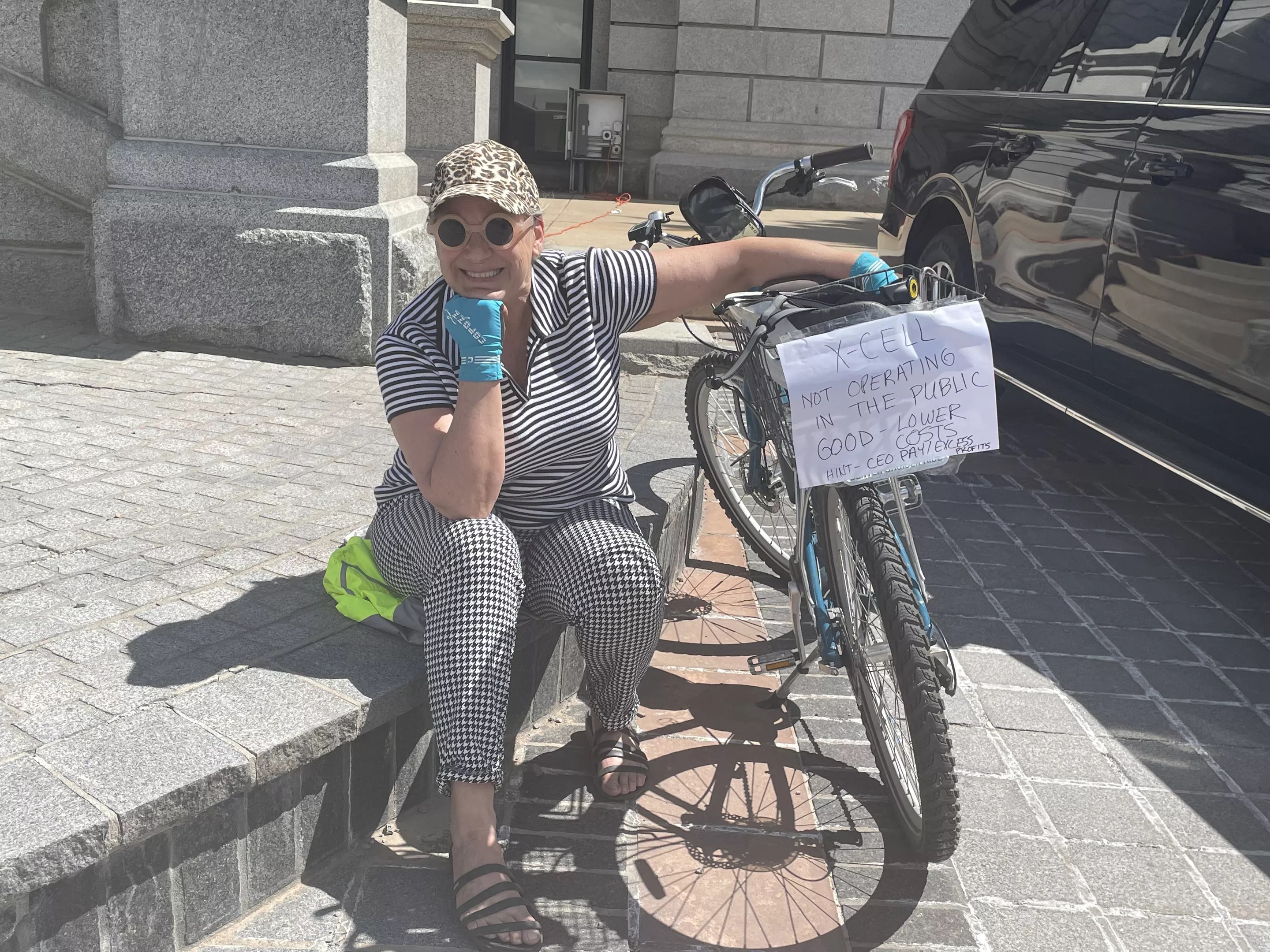
Catie Cheshire

Audio By Carbonatix
One month this winter, Michelle Mottler received a gas bill totaling over $500 from Xcel Energy.
Mottler was out of work and low on cash, to the point that she and her 81-year-old mother, who lives in an auxiliary dwelling unit behind her house in west Denver, weren’t able to eat without help from a food pantry. The hefty Xcel bill was completely impossible – and turning down the heat wasn’t an option.
“Once she had gotten so cold, her teeth chattered so violently she broke a tooth,” Mottler says of her mother. “So she’s really afraid of being too cold. … Part of that heating cost is keeping her comfortable during the winter. I take that responsibility seriously.”
Speaking at an April 12 rally focusing on utility bill affordability, Mottler described how she lost her job in 2021 and later qualified for the state’s Low-income Energy Assistance Program. Although she had to wait until tax time this year to document her income – she’s been living on 401(k) disbursements – she was ultimately able to qualify again for help from LEAP, which covered the costs to avoid disconnection.
Mottler says that her situation isn’t unique; in fact, it’s a fairly common scenario for people her age who lost work during the pandemic and have struggled to find new jobs. Now she’s ready for Xcel to be held accountable.
“They have a mandate to operate in the public interest because they are a monopoly, which means they shouldn’t be making excess profits, or have their CEO paid hundreds of times more than their average worker,” Mottler says. “It’s just wrong.”
Xcel brought in $1.7 billion in profits in 2022, according to its year-end earnings report.
The Colorado Public Utilities Commission, which is in charge of regulating the energy giant, caught heat for not protecting customers from its practices.
The change Mottler hopes for could be coming soon, though, as the PUC finalized its Affordability Initiative Initial Work Plan on April 11.

Michelle Mottler is one Denver resident who was impacted by high Xcel Energy bills.
Catie Cheshire
The three PUC commissioners, along with Interim PUC Director Harris Adams, sent a letter to Governor Jared Polis and Patty Salazar – executive director of the Colorado Department of Regulatory Affairs – announcing the commission’s plan for affordability.
“The commission is moving forward with a significant work plan designed to emphasize our focus on affordability and energy burden, gas market and infrastructure conditions, and to continue efforts around conservation and electrification,” the letter said.
The plan tackles what the commission will do about bill affordability from now until October; actions it plans to take from November 2023 to April 2024; what it will do from May 2024 and beyond; and ongoing tasks regarding affordability.
The initial October date is key, as that’s when high gas usage season begins in Colorado, with temperatures getting colder and people using gas to heat their homes.
“Because the Commission must act within the law and provide due process to regulated utilities and other parties, proceedings initiated in the near term may take months to complete,” the plan warns.
Still, residents who’ve repeatedly told the commission that action needs to be taken now will be glad to see items like Gas Performance Incentive Plans – which will work on giving utilities the same skin in the game as customers when it comes to the cost of natural gas – coming in June, as well as an evaluation of the effectiveness of utilities’ conservation messaging that’s anticipated in June or July.
The commission’s exploration into natural gas issues matches up with concerns expressed at the April 12 rally about rising energy bills. Members of the Colorado Legislature convened a Joint Select Committee on Rising Utility Rates back in February in response to their constituents’ worries. On Wednesday, legislators were urged to act on the committee’s findings.
“Gas is really fueling the high costs that we are all experiencing at our kitchen table, in our small businesses, in our churches,” said Danny Katz, executive director of the Colorado Public Interest Research Group, a consumer watchdog organization that helped set up the rally. “This is a volatile fuel and an expensive fuel. This is not something that we should be relying on, and certainly not something we should be doing more to invest in.”

A list of Colorado residents’ staggering utility bill totals.
Catie Cheshire
The committee wound up hearing from experts who testified that nearly 80 percent of the increase in utility bills this winter was a result of the cost of natural gas, Katz added, with people at the rally proclaiming that gas is not the answer. Speakers advocated for a transition to renewable energy, as Polis did in February when he released directives aimed at tackling utility bill affordability.
Three of the PUC’s six categories of activities in its affordability plan specifically address gas cost, infrastructure and conservation. The plan describes how global events like the Russian invasion of Ukraine have created a volatile natural gas market following nearly a decade of stability.
“These dynamics highlight the need for a comprehensive review of affordability, focused on relieving the energy burden for the most vulnerable customers, exploring improvements to how gas costs are flowed into customer rates, enhancing access to energy assistance, and considering a variety of other tools and strategies to address high and volatile gas prices,” the plan concludes.
Utilities pass on the commodity cost of natural gas to customers, so the commission is currently working on Gas Performance Incentive Plans intended to incentivize utilities to better manage gas purchasing “by aligning incentives such that when customers face high gas prices, the gas utility bears some of those costs, and vice versa.”
Xcel also got in on the action, filing plans to expand its electric and gas affordability programs with the PUC on April 13. It won’t expand those programs without the help of its struggling customers, however.
“The expanded funding would be provided through the Service and Facilities fee on monthly bills and represents an additional $1.48 a month on a combination natural gas and electric customers’ bills,” the company’s news release says on the subject.
Topazz McBride, vice president of social justice for the Greater Denver Ministerial Alliance and environmental justice committee chair for the NAACP Aurora Chapter, said at the rally that at Restoration Christian Fellowship – a church that provides shelter to unhoused people in Aurora – the utility bill went from a maximum of $2,500 last year to $10,000 this year.
“Please consider that we need quality of life at every level,” McBride said. “As nonprofits, as residents, as businesses, we need to get these bills down.”
State representatives Chris deGruy Kennedy and Matthew Martinez assured those at the rally that the legislature is taking steps to get bills down. Kennedy, who is speaker pro tempore of the House, led the special committee on utility rates and announced legislation that will debut soon.
The legislation will address gas cost incentives, take away profit motives for building new gas infrastructure, and ensure the costs of advertising, lobbying and legal expenses for utilities don’t all end up on customers’ shoulders.
“We’re getting toward the end of the session, and it’s going to be a pretty heavy lift,” Kennedy said. “But we’ve got a lot of people that are really committed to this cause.”
Mottler certainly thinks the government needs to be committed to getting Xcel to manage the energy grid better.
“We need a little bit more resilience,” she concludes.